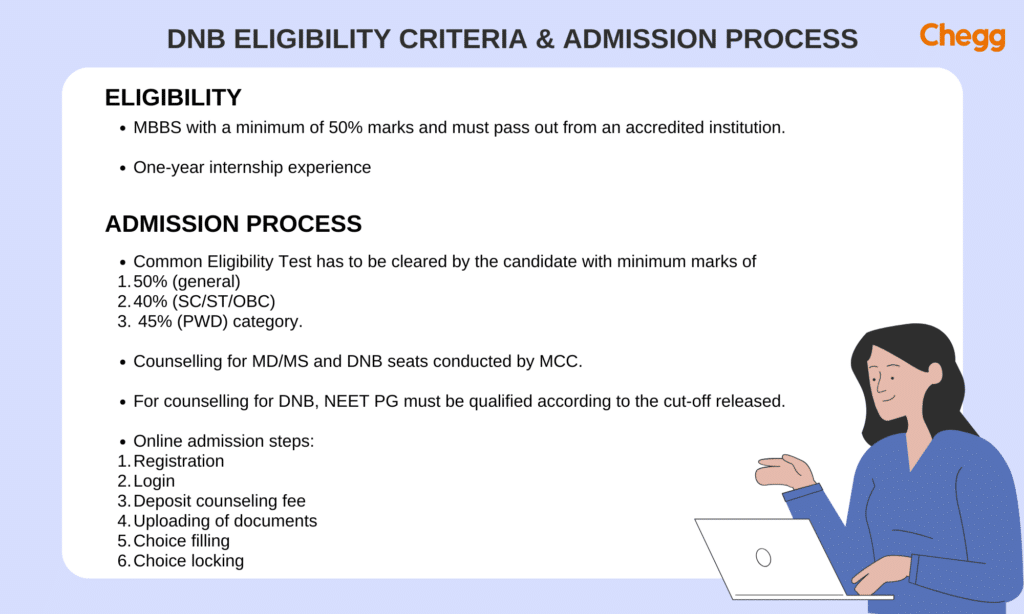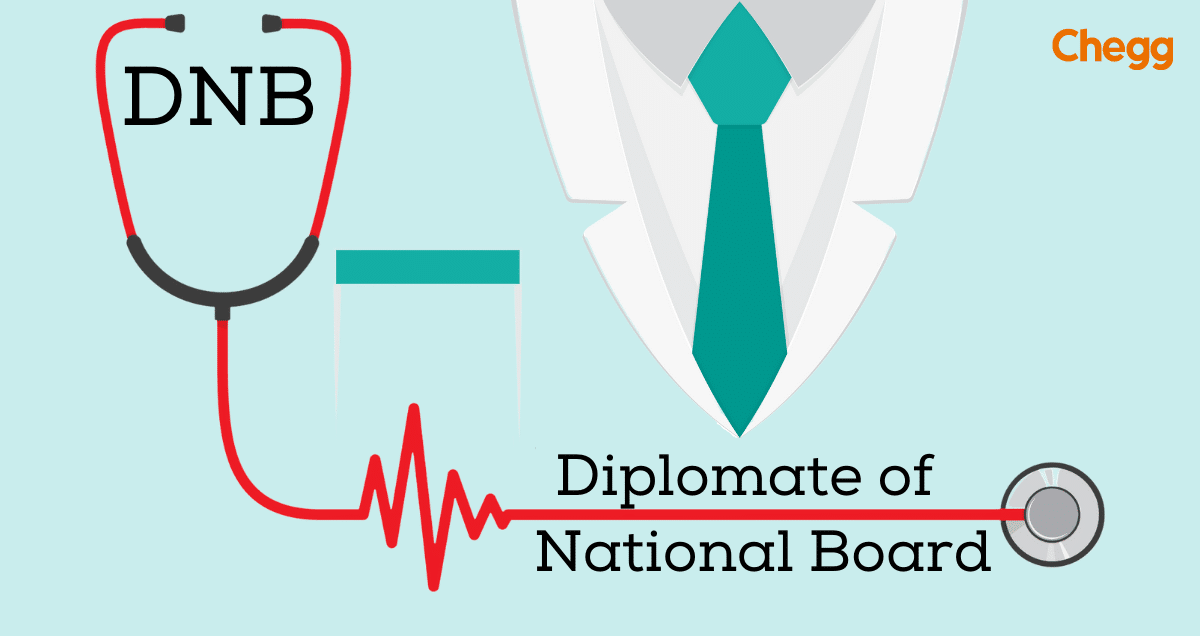Table of Contents
DNB Full Form
DNB full form in medical stands for Diplomate of National Board. It is an honor/title awarded by the National Board of Examinations (NBE). It is awarded to candidates who complete their postgraduate or postdoctoral medical education under it. NBE is an independent body that comes under the aegis of the Ministry of Health and Family Welfare.
The admission process for a DNB degree course is based on the merit score of the students in medical entrance exams. Candidates must possess their internship completion certificate in addition to the Certificate of Permanent Registration with the Medical Council of India (MCI) and must submit it when required. The entrance exams for this course are :
- NEET PG
- Diplomatic National Board Common Entrance Test.
The DNB full form in medicine is Diplomate of National Board and it shares the same status as the Doctorate of Medicine (MD) awarded in the medical field and Master of Chirurgiae (MCh) degrees in surgical super specialties. field respectively.
Diploma of National Board (DNB full form) degrees are recognized by the Government of India and a Gazette order is published for the same.

DNB Course Highlights
| Aspect | Description |
| DNB Full Form | Diplomate of National Board |
| Level of Course | Post Graduate |
| Duration of Course | 3 Years |
| Admission Process | Entrance Based |
| Course Fee | 1.1 Lakh |
| Eligibility Criteria | MBBS Passed |
| Entrance Exam | NEET-PG |
| Average Salary | 35 Lakh |
| Top Recruiters | Central Bureau of Investigation CBI), Hospitals, Intelligence Bureau (IB), Law Firms, Police departments, Forensic Sciences Lab, Defence/Army, Private Detective Agencies, Central govt. |
| Job Positions | Investigative Officers, Crime Reporters, Forensic Experts, Forensic Scientists, Fingerprint Experts, Handwriting Experts, etc. |
DNB Syllabus
1. Anatomy
Gross Anatomy of the upper limb, lower limb, thorax, abdomen, pelvis, perineum, head and neck, brain, and spinal cord which forms almost the entire body.
(Developmental anatomy/embryology)
General embryology: fertilization, implantation and placenta, early human embryonic development
2. Physiology:
- Paper 1 to be titled “General Physiology including History of Physiology”
- Final (Part 2) Paper 3 “Systemic Physiology (iii) including recent advaPrimarynces.
3. Biochemistry
- Cell biology: cell structure, Glycoproteins and proteoglycans, Extracellular Matrix, Integrins
- Biostatistics/research methodology: Types of study design, Types of study design
4. Pathology
General Pathology: Normal cell and tissue structure and function, Cellular adaptation cell injury and cell death, Acute and chronic inflammation, Tissue renewal and repair:
5. Microbiology
- MEDICAL MICROBIOLOGY
- Immunology
- Systematic bacteriology
- Mycobacteriology
- Anaerobic bacteriology
6. Pharmacology
- General Pharmacological Principles & Allied Sciences
- Systemic Pharmacology, Chemotherapy and Therapeutics
- Experimental Pharmacology, Bioassay, and Statistics
7. Ophthalmology
The Basic Sciences: Orbital and Ocular Anatomy
- Gross anatomy
- Histology
- Biostatistics, Research Methodology, and Clinical Epidemiology
8. ENT
- Molecular biology
- Genetics
- Gene therapy
9. General Medicine
- Basic Sciences
- CARDIOLOGY
- NEUROLOGY
10. Pediatrics
- Basic Immunology
- Embryogenesis of different organ systems especially, the heart
11. Orthopaedics
Development of skeleton & mineralization of bone
Ethics in Orthopaedics, evidence-based practice, outcome assessment, use of biostatistics
Course Structure
| Sem1 | Sem 2 | Sem 3 | Sem4 | Sem5 | Sem 6 |
| Anatomy | Pathology | Forensic medicine | SPM Statistics Biomedical research | Orthopaedics | Obstetrics & Gynaecology |
| Physiology | Microbiology | Ophthalmology | Psychiatry | Anaesthesiology | Pediatrics |
| Biochemistry | Pharmacology | ENT | General Medicine | Radiology | Pharmacology |
- The duration of the Diplomate of National Board (DNB full form) is 3 years which consists of 6 semesters. It is a Postgraduate level program equivalent to that of the Post-Graduate or Post-Doctoral programs in the medical field. The organizers divide the DNB program into two categories: DNB Super Specialists and DNB in Broad Specialities.
- The DNB program consists of 6 semesters.
- Internships are available at both government and private colleges, as well as private pharma companies are also recruiting DNB pass-outs and interns.
- To enter the DNB Course one must crack the CET exam for it after completing MBBS and a one-year internship.
Eligibility Criteria
- The candidate must be an MBBS with a minimum of 50% marks and must pass out from an accredited institution.
- The candidate must complete a one-year internship, it can be through Government or non-government sources as well.
- The candidate must qualify for the entrance exam conducted by the National Boards of Education(NBE).
- The candidate must clear the Common Eligibility Test(CET).
Admission Process
- Common Eligibility Test has to be cleared by the candidate with minimum marks of 50% (general), 40% (SC/ST/OBC), and 45%(PWD) category. These are subject to change with new notifications every time the exam is conducted.
- Nowadays, there is common counseling for MD/MS and DNB seats which is conducted by MCC.
- For counseling for DNB, NEET PG must be qualified according to the cut-off released.
Online admission steps:
- Step 1 Registration: Students must create an account in this step by providing basic information such as their phone number and email address.
- Step 2 Application Form: Provide all the information requested on the application. It is important to make sure that every detail is true and correct.
- Step 3 Uploading of Documents: Scan and upload all necessary files, including signatures, photos, and mark sheets. The institute’s application portal allows you to upload documents in only one specified format.
- Step 4 Payment of Application Fees: Candidates must pay the application fees online or offline.
- Step 5 Downloading of Admit Card: After each applicant’s eligibility has been verified, admit cards are given out. Download and print out the admit card to use it on the day of the exam.
- Step 6 Entrance Exam: Prepare for the exam according to the syllabus and past papers. Attend the exam on the announced date.
- Step 7 Result: A few weeks after the exam date, they announce the results. If a candidate passes the entrance examinations, they may move to the next round.
- Step 8 Counselling/Personal Interview and Admission: Counselling or PI is held for students who have passed the entrance exams. The student can now enroll in the DNB course.
DNB Counselling
Diplomate of National Board (DNB full form) counseling is done after you have cleared the entrance exam. DNB seats will be allotted based on marks scored in NEET PG and the choice of hospitals made by applicants. Although the fees are the same (1,25,000/PA) for all the hospitals.
There are 2-3 rounds of counseling to fill the seats, 2 & 3 rounds are required when the seats remain vacant after the first round of counseling. If any candidate pays the fees but does not get any allotment, his admission will be canceled and his fees will be refunded. If you have been allotted the hospital in round 1 of counseling and you further want to join the counseling process then you must inform the college about the same.
NEET PG score ensures admission to the desired hospital and branch .2023 cutoff was 291 for general,257 for SC/ST/OBC, and 274 for general-PH.
DNB Job Profile
1. Paediatric
- Defining procedures and discussing test results or prescribed treatments with patients and family members.
- Constant Monitoring of patients’ conditions and progress.
- Coordinating by referring patients to nurses, students, assistants, specialists, therapists, and other medical staff.
- Ordering, performing, and diagnosing the tests for the patients.
- Annual average salary in (INR): 20-35 lakhs
2. Ophthalmologists
- These are the doctors who diagnose, prevent, and treat diseases related to the eye and visual system.
- They perform both the duties of a physician as well as a surgeon.
- They manage ophthalmic conditions by considering both the medical and psychological aspects of a patient.
- In this field, you have to manage eye disorders that can be related to whole-body disease which can be diabetes, stroke, etc.
- Annual average salary in (INR): 10-12 lakhs
3. Nephrologists
- They are kidney doctors or can be physicians with kidney problems related to patients who are dealing with infections, stones, or any other disorders.
- Nephrologists usually prefer non-surgical methods to treat the patient. A kidney is very important for fluid and electrolyte management in the body.
- Annual average salary in (INR): 16-21 lakhs
4. Geriatricians Cardiologists
- Geriatric doctors collaborate with nurses, lab technicians, and specialists to treat older age patients suffering from acute illness or living with chronic medical conditions.
- They provide holistic care to the patients. The physician must refer the patient to a geriatric doctor for treatment.
- Annual average salary in (INR): 12-16 lakhs
5. Anaesthesiologist
- An anesthesiologist performs the vital role of giving anesthesia to the patients who will be undergoing surgery, manages any medical issue that may arise during its effect, and also ensures that he/she performs a smooth recovery after its effect.
- They make critical decisions regarding dosage, pain management, and patient discharge.
- Annual average salary in (INR): 10-11 lakhs
What to choose DNB/ MD or MS as a Career
Most government agencies take physicians with DNB into account. For Diplomate of National Board (DNB full form) consideration, certain medical colleges require additional work experience. Therefore, finding a job doesn’t differ that much.
Although the public perception may initially pose challenges for DNB in private practice, people acknowledge it to be on par.
DNB, MD/MS Which is Better?
- If you wish to practice in India in a private capacity, DNB and MD/MS are equally valuable.
- The academic and research fields are more open to those with MD/MS degrees, which are also regarded as more prestigious.
- A medical college teaching position prefers candidates with an MD or MS slightly more.
- Greater options for clinical and private practice are available with a DNB degree.
- Additionally, DNB is somewhat more preferred for practicing abroad.
For more Full Forms → Click Here
Conclusion
Diplomate of National Board (DNB full form) in medical is Diplomate of National Board is a degree awarded the same as MD/MS. It is done after an MBBS degree, and a one-year internship, and for entering this course one must be NEET PG qualified and must also clear the CET exam. It is a 3-year course. The National Board of Exams (NBE) honors it.
Learn more about some other full forms:
| DMLT Full Form | MBBS Full Form | Ph.D. Full-Form |
| BAMS full form | Md Full Form | |
| BDS Full Form | BHMS Full Form | BAMS full form |
DNB Full Form: FAQs
What is the DNB full form?
DNB full form stands for Diplomate of the National Board.
Who is eligible for DNB?
A recognized institute’s MBBS degree is a prerequisite for candidates. A year-long internship is a requirement for applicants. The candidates must pass the Common Eligibility Test (CET). The National Board of Education (NBE) entrance exam must be passed by them.
Is it not better than MD/MS?
Diplomate of National Board (DNB full form) is given equal weightage as it is given to MD/MS.
Is DNB higher than MD?
Diplomate of National Board (DNB full form) and Master of Medicine (MD) are equivalent.
What is the tenure of DNB?
DNB is a 3-year course with 6 semesters.
What are the minimum marks for the DNB course?
50% marks in MBBS(minimum).
Can a DNB doctor do surgery?
Following successful completion of the NBE final exam, the candidate should continue to be qualified to practice general surgery. This calls for a deep understanding of the fundamentals.
Got a question on this topic?
